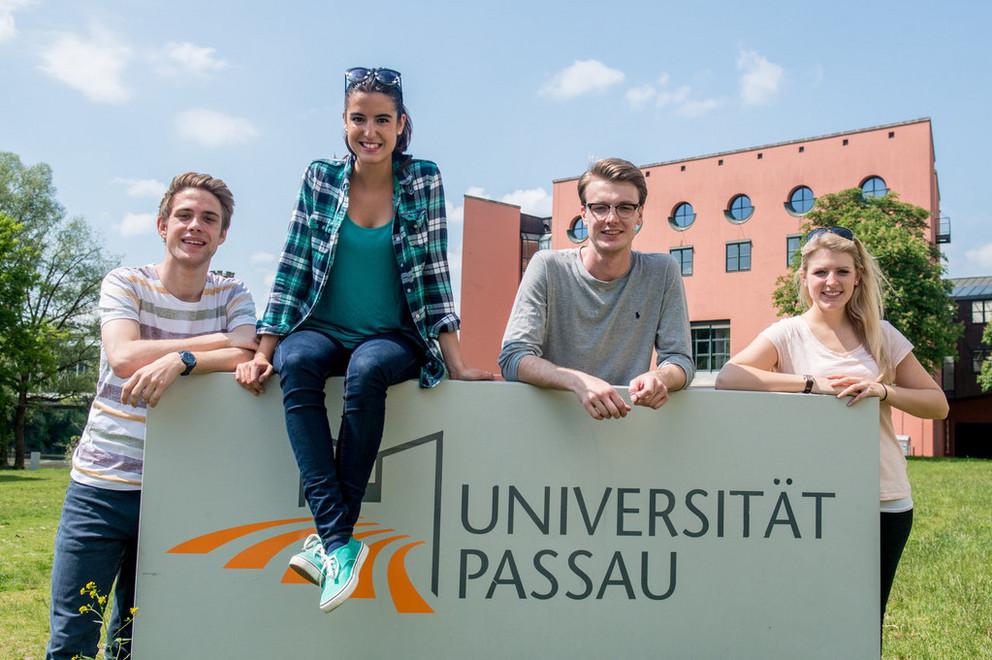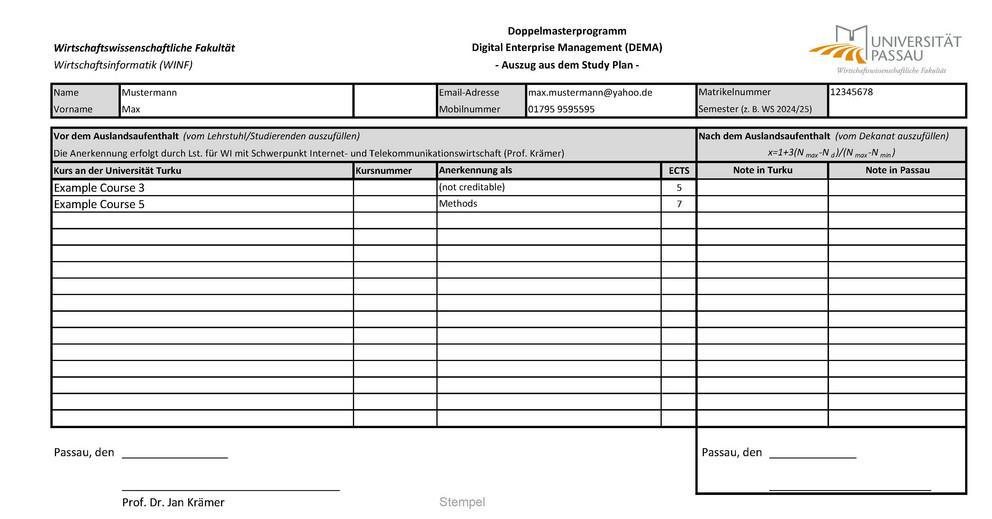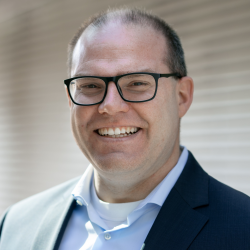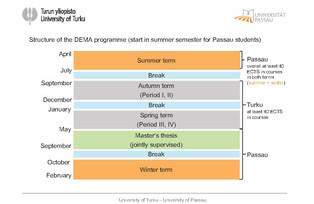For programme participants


The programme is organized such that students pursue the course programme in their first academic year (winter and summer semester: October – July) at the University of Passau with a focus on networked business and digital ecosystems. Subsequently, students pursue their second academic year (periods I-IV: September – May) at the University of Turku with a focus on IT-Management. Thus, German and Finnish students from the same cohort will pursue the programme together during the entire duration of the course programme. After completion of the course programme, students will write their master’s thesis at their respective home university.
For Passau students there is also the possibility to start the programme in a summer semester (April - July) at the University of Passau. Then students continue the programme at the University of Turku (periods I-IV: September - May). Afterwards students study another semester (October - February) at the University of Passau to complete the course programme by writing their master's thesis.
In total at least 40 ECTS in courses (NOT including seminar and master’s thesis) have to be taken at each partner university.
Students will have to fulfil individually the requirements of each university’s master’s programme (120 ECTS each) in order to be awarded the double degree. Generally, courses taken at either university will count towards both degree programmes. To ensure eligibility of courses and a coherent study programme, students have to devise a study plan, which must be approved by the Board of the double-degree programme.
Masters’ thesis and seminar will be jointly supervised by academic partners at both universities, but each must be written at the home university. Both, seminar and masters’ thesis need to be written in English.
FAQ für students going to Turku:
- The DEMA students apply via online application for Turku, they also have to include their LAs (learning agreement = list of courses they are going to study in Turku) in the application.
- The University of Turku accepts the DEMA students and sends instructions what to do and when studies start.
- Students are responsible for searching housing in Turku (instructions are given) and arranging their travelling to Turku.
- Students take part on the orientation week for exchange students (here they will get all relevant university related information).
- The information systems department arranges a welcome meeting for the DEMA students, where they get programme specific information, and they have a contact person at the department to support their studies.
The DEMA students have two kind of status during their stay in Turku. They are degree students of the GITM DEMA programme and they also have the exchange student status.
The link below gives all the relevant information for the exchange: https://www.utu.fi/en/study-at-utu/exchange-studies
Autumn term starts in September and it ends before Christmas, spring term starts in January and it ends at the end of April. Every term has two periods which are about 6-7 weeks long. Usually you start studying at the University of Turku at the end of August where you participate in the orientation week. Information about the orientation for new international students: https://www.utu.fi/en/study-at-utu/accepted-students/orientation
There are about 300 courses in English which you can attend. But keep in mind that you have to fulfil the requirements of the Master’s programme of the Universities of Passau and Turku. Find more information here: Study guide University of Turku and Courses of the DEMA in the GITM programme at TSE
In many courses you do not have to enrol in advance, but it is important to attend the first lesson. Some courses have limited capacity, there you have to enrol about one week before the course starts.
The study plan must be produced at the beginning of the double masters course and it must be signed by Prof. Krämer and yourself, only then it is valid. Any change must be agreed and signed by Prof. Krämer, otherwise it is not valid.
The Learning Agreement, which is automatically generated from the study plan, must be signed by the Chairman of the Examination Commission for Information Systems and then submitted to the Dean's Office of the School of Business, Economics and Information Systems.
In order to apply for Erasmus+ funding, the “Gesamt-Learning Agreement” (http://www.uni-passau.de/internationales/ins-ausland-gehen/europaeische-partnerhochschulen-erasmus/nach-der-erfolgreichen-bewerbung/ ) must also be completed and submitted to the Dean's Office. After verification by the Dean's office and signature by the dean of studies, you will receive an e-mail from the Dean's office stating that your documents are ready for collection. As part of the DEMA double master course, you will also need a valid Study Plan signed by Prof. Krämer, which replaces the Individual Learning Agreements.
Since changes in the Study Plan may still occur during the semester, the two Learning Agreements should only be submitted to the Dean's office about 1 month before your stay in Turku.
At each university, the courses will be accepted with their original ECTS.
Usually courses have an exam at the end of the term. However, the final exam usually does not make up 100 % of the final grade. In most of the courses you are given individual assignments during the term that also count towards the final grade.
The structure of the programme is designed to enable you to complete it in 4 terms/semesters. Due to the different term system in Finland (Period I-IV) an extension at the University of Turku is not possible.
Masters’ thesis and seminar will be jointly supervised by academic partners at both universities, but each must be written at the home university. Both, seminar and master's thesis need to be written in English.
- DEMA Students first choose a supervisor at their home university going through the usual process.
- The supervisor is responsible for giving them a general topic. The supervisor then notifies the other university of the fact that he/she is supervising the given student and what the topic is. The other university then assigns a supervisor, too, and notifies back on who the other supervisor is.
- At a later point in time (before the thesis is formally registered), the supervisor shares a written research exposé (laying out topic, research method and some related literature) with the other university. The other university provides a brief feedback on the exposé, or just acknolwedges its receipt.
- The thesis is formally registered (in Passau), fixing the title of the thesis.
- If a presentation of the thesis is arranged, the other university is invited to that presentation in due time.
- The thesis is formally handed in at the home university and at the other university, going through the respective procedures.
- A formal written evaluation of the thesis (in Turku this is in English, In Passau this can be in English or German) is provided to the other university.
It is theoretically possible but we advise you not to write your master's thesis in cooperation with a company, due to the fact that there are already two institutions who supervise it.
Please note the following so that your grades from Turku can be entered in your grade overview:
- The dean's office (notenumrechnung.wiwi@uni-passau.de) is responsible for converting the grades. They need the original transcript from Turku or a copy certified by the International Office as well as the part of the study plan on which the grades can be entered (example below).
- Once your grades have been converted, you will receive the documents back and can submit them to the Examinations Office for registration.
- For more information click here.

There is a tutor system for degree and exchange students at the University of Turku. A personal tutor system engages voluntary and trained Finnish or foreign students to help you with practical matters and to guide you through student life in Turku. Each tutor has about 3-5 exchange or degree students: https://www.utu.fi/en/study-at-utu/accepted-students/orientation; Student Union of the University of Turku (TYY): www.tyy.fi/en; Erasmus Student Network Uni Turku: https://esnuniturku.fi
Living expenses
The general costs of living are higher in Finland. However, meals and living on campus are subsidised. Meals cost 2,60 € in student cafeterias with a student card. There are eleven student cafeterias and they are open Monday to Friday/Saturday. The opening hours differ in the different cafeterias, some start with breakfast at 8:30, some close at 20:00 o’clock.
Housing
Former DEMA exchange students recommend the Turku Student Village. Please bear in mind, that you should apply for housing at least six weeks before the lease begins. Housing providers: TYS and Retrodorm.
https://www.utu.fi/en/study-at-utu/accepted-students/housing
Cost of student housing per month is about 285- 500 Euros.
Exchange students can borrow a package with household items which they then return before they leave Turku: www.tyy.fi/en/students/starting-package-storage
Health insurance
There is no need for an extra insurance. Holders of the European Health Insurance Card are entitled to the same health services as the Finnish people.
https://www.utu.fi/en/study-at-utu/accepted-students/residence-permit
Side job
It is possible but it might be difficult without speaking good Finnish. Furthermore, you need more time during the term for the individual assignments you are given in several courses. Moreover, there are no jobs as a research and teaching assistant as is common at German universities.
Residence permit
EU/EEA citizens do not need a residence permit, but must register their right to reside in Finland as a student if their stay lasts longer than three months. This is only a formality. https://www.utu.fi/en/study-at-utu/accepted-students/residence-permit
What to do on the first days in Turku
https://www.utu.fi/en/study-at-utu/accepted-students/getting-started
- https://www.utu.fi/en/how-to-get-to-turku-move-around-in-the-city
By air: Turku Airport or Helsinki-Vantaa
By bus: The national long distance bus service Matkahuolto departs from local bus stations all throughout Finland and also from Helsinki-Vantaa airport.
https://www.onnibus.com/home
By train: There is a train connection from Helsinki-Vantaa airport to Turku. https://www.vr.fi/en - By ferry: Viking Line: https://www.vikingline.de/?_ga=2.76215004.859930590.1512121738-216699713.1512121738 Stockholm - Turku
Silja Line: https://www.tallinksilja.com/en/book-a-cruise Stockholm - Turku; Aland - Turku; Riga - Turku
Finnlines: https://www.finnlines.com/de/ Travemünde - Helsinki - Public Transport in Turku: https://www.foli.fi/en
- Travel Agency specialized in group travel to Scandinavia (Lapland, Iceland, Norway), Russia (St Petersburg & Moscow) and Baltics for international students. https://www.timetravels.fi
Here you will find experience reports and tips for the Double Master Degree in Digital Enterprise Management (DEMA)/Information Systems: http://itwdata.uni-passau.de/wiki/index.php/Erlebnisberichte_und_praktische_Tipps_f%C3%BCr_Passauer_Studierende_im_Doppelmaster_mit_der_Universit%C3%A4t_Turku
FAQ for students going to Passau
- Generally, from the point of nomination/selection as DEMA students, the International Office of the University of Passau will guide students through the registration process, which ends in the orientation week.
- What is really important is that Turku students participate in the orientation week at the University of Passau, which is held the week before the winter term begins. The date changes slighty every year, as the start of the winter term varies from year to year. See here for a list of dates in the coming years: https://www.uni-passau.de/en/study/getting-organised/academic-calendar/
- More information on the orientation week can be found here: http://www.uni-passau.de/en/international/coming-to-passau/intl-orientation-weeks/
- It is also during the orientation week that DEMA students will be registered (with full student status - not „just“ as exchange students) at the University of Passau.
- All inquiries and questions that Turku students might have concerning this process should be directed to the International Office and its Tutors.
- Checkliste for international students upon arrival in Passau
The academic year begins with the winter semester/term, which starts on 1 October and ends on 31 March. The summer semester/term then runs from 1 April to 30 September each year. Teaching in the winter semester starts in the middle of October. https://www.uni-passau.de/en/study/getting-organised/academic-calendar/
The International Students’ Orientation Weeks start in the middle of September
http://www.uni-passau.de/en/international/coming-to-passau/intl-orientation-weeks/
There are several courses in English which you can attend at the University of Passau. But keep in mind that you have to fulfil the requirements of the Master’s programme of the Universities of Passau and Turku.
University of Passau: http://www.uni-passau.de/en/study/study-options/english-taught/
Once you have a campus network username and a password you can log in to a system called Stud.IP. There you can find information about courses, enrol online to courses and events, co-ordinate your chosen courses and events, put together your timetable or download course materials.
No, the study plan will be signed by the professors of the board and this will substitute a Learning Agreement, i.e., it will serve as a commitment to the student to accept the courses passed at the foreign university and at the home university. At each university, the courses will be accepted with their original ECTS.
Usually courses have an exam at the end of the term which makes up 100 % of the final grade. In some cases individual assignments during the term will also count towards the final grade.
The structure of the programme is designed to enable you to complete it in two years. Due to the different semester/term system in Germany (winter term and summer term) an extension at the University of Passau is generally not possible.
Master's thesis and seminar will be jointly supervised by academic partners at both universities, but each must be written at the home university. Both, seminar and master's thesis need to be written in English.
1. DEMA Students first choose a supervisor at their home university going through the usual process.
2. The supervisor is responsible for giving them a general topic. The supervisor then notifies the other university of the fact that he/she is supervising the given student and what the topic is. The other university then assigns a supervisor, too, and notifies back on who the other supervisor is.
3. At a later point in time (before the thesis is formally registered), the supervisor shares a written research exposé (laying out topic, research method and some related literature) with the other university. The other university provides a brief feedback on the exposé, or just acknolwedges its receipt.
4. The thesis is formally registered, fixing the title of the thesis.
5. If a presentation of the thesis is arranged, the other university is invited to that presentation in due time.
6. The thesis is formally handed in at the home university and at the other university, going through the respective procedures.
7. A formal written evaluation of the thesis (in Turku this is in English, In Passau this can be in English or German) is provided to the other university.
It is theoretically possible but we advise you not to write your master's thesis in cooperation with a company, due to the fact that there are already two institutions who supervise it.
There is a tutor system for degree and exchange students called buddy scheme at the University of Passau. A personal tutor system engages voluntary and trained German or foreign students to help you with practical matters and to guide you through student life in Passau. You can register for the buddy scheme via an online application form.
http://www.uni-passau.de/en/international/coming-to-passau/getting-settled/buddy-scheme/
Fachschaft WIWI: http://www.wiwi.uni-passau.de/fachschaft-wiwi/
Living expenses
http://www.uni-passau.de/en/international/coming-to-passau/cost-of-living-and-funding-options/
Compared to other European countries, the cost of living in Germany is quite reasonable.
The University of Passau does not charge tuition fees. However, you have to pay a contribution of currently 106 € per semester at matriculation and re-registration. Much of this semester contribution goes to the student services association, which runs the refectory, cafeterias and halls of residence, among other things. The semester contribution also includes the fees for a semester bus pass for buses operated by Stadtwerke Passau (SWP). http://www.uni-passau.de/en/international/coming-to-passau/getting-settled/semester-bus-pass/
Meals cost about 2,00 - 6,00 € in the mensa (refectory) or the student cafeterias with a student card. The mensa in Passau is directly by the river Inn, right behind the WiWi (economics and law) building. It differs from other canteens particularly in that it doesn't serve a uniform meal - each guest can put together his or her own meal from the dishes served along the counter. Opening times: Monday to Friday, 11:00 – 14:15. There are also four student cafeterias which are open Monday to Friday. The opening hours differ in the different cafeterias, some start with breakfast at 7:30, some close at 19:00 o’clock, one is open Monday to Saturday.
Housing
The International Office of the University of Passau has set up an accommodation service for international students.
http://www.uni-passau.de/en/international/coming-to-passau/getting-settled/accommodation/
Cost of student housing per month is about 250 - 400 Euros.
Health insurance
If you are covered by statutory health insurance from Finland you are exempt from the requirement to obtain German health insurance. However, you have to show your European Health Insurance Card (EHIC), form E128 to the AOK office in Passau (Dr.-Hans-Kapfinger-Strasse 14a, Passau). You will then be issued a health insurance card, which you should present whenever you go to see a doctor.
If you are privately insured in your home country you will need written confirmation that your insurance coverage meets the German and European legal requirements. Travel health insurance policies are not accepted, as they do not provide sufficient coverage!
http://www.uni-passau.de/en/international/coming-to-passau/getting-settled/health-insurance/
Side jobs
There are many ways of earning money while you study, for example as waiting staff, academic assistants or private tutors. A knowledge of German will improve your chances of finding a part-time job. But please be aware of the legal regulations. https://www.study-in.de/en/plan-your-stay/job-and-career/part-time-job_26928.php
Residence permit
EU/EEA citizens do not need a residence permit, but must register their right to reside in Germany as a student if their stay lasts longer than three months. This is only a formality. Registration is free of charge, but you are legally required to do so within one week of moving in to your new accommodation. You can register with the Bürgerbüro (‘citizens’ office’: Rathausplatz 2, Passau or Vornholzstr. 40, Passau). Student helpers will be on hand to assist you with the formalities during the Orientation Weeks for International Students.
What to do on your first days in Passau
http://www.uni-passau.de/en/international/coming-to-passau/intl-orientation-weeks/
Checklist for international students
By plane
From Munich airport:
Onward journey by train (via Landshut):
Regional day ticket for Bavaria ("Bayern-Ticket"): for groups up to five people, valid in all local trains and almost all buses in Bavaria, from 32 €, more information on the German rail website
Onward journey by (rental) car:
via Autobahn A92 Landshut - A3 Passau (about 1,5 hours)
find more information here: www.munich-airport.de
From Frankfurt/Main airport:
Onward journey by train: direct or via Hanau ICE train to Passau about 4,5 hours
Onward journey by car: via autobahn A3 to Passau
From Nuremberg airport:
Onward journey by train: via Nuremberg city: direct ICE train to Passau about 2,5 hours
Onward journey by car: via autobahn A3 to Passau
From Linz/Austria airport:
Onward journey by train: via Hörsching: direct train to Passau about 2 hours
Onward journey by car: via autobahn (toll road) A25/A8
By train
Find your suitable train schedule here: https://www.bahn.de
Intercity (IC) trains:
Nuremberg – Passau – Vienna
Dortmund – Cologne – Frankfurt/Main – Würzburg – Nuremberg – Regensburg – Passau – Linz – Vienna – Budapest
Intercity Express (ICE) trains:
Ostend – Amsterdam – Brussels – Aachen – Frankfurt/Main – Würzburg – Nuremberg – Regensburg – Passau – Vienna
Hamburg – Hanover – Göttingen – Würzburg – Nuremberg – Passau – Vienna
Regional trains (RE):
Munich – Landshut – Plattling – Passau
By car
Using the highway (Autobahn):
A3 Cologne – Frankfurt – Nuremberg – Passau – Linz – Vienna
A92/A3 Munich – Landshut – Deggendorf – Passau
Distances - Duration (conservative):
Munich 200 km - 2:00 h, Munich airport 160 km - 1:30 h
Nuremberg 230 km - 2:20 h
Frankfurt/Main 450 km - 4:20 h
Linz/Austria 80 km - 1:15 h
Vienna 300 km - 2:50 h
Prague 220 km - 3:05 h
Regensburg 125 km - 1:30 h
Programme coordinator

Prof. Dr. Jan Krämer
Room HK12 218
Phone: +49(0)851/509-2580
Fax: +49(0)851/509-2582
Jan.Kraemer@uni-passau.de
Consultation hours: Wednesdays from 2 to 3 p.m. by prior arrangement via the secretary's office.



